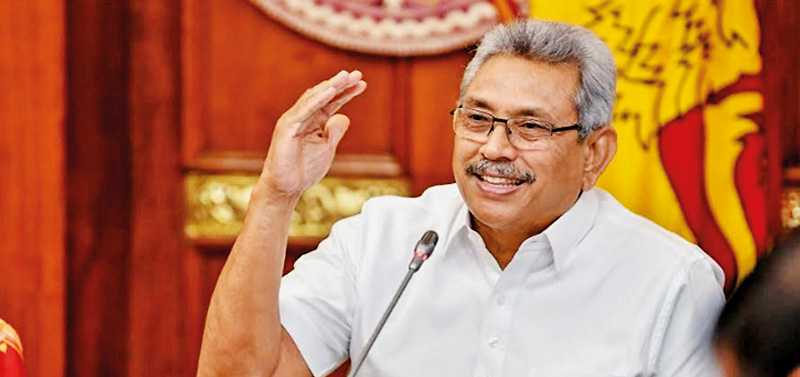Thursday Feb 19, 2026
Thursday Feb 19, 2026
Monday, 10 May 2021 00:00 - - {{hitsCtrl.values.hits}}

At present, the President, whose administrative experience doesn’t go beyond issuing military orders, seems to adopt the same tactic on matters of economic development also. Import bans introduced in ad hoc manner will not make the economy self-sufficient
 ‘Vistas of prosperity and splendour’, ‘food self-sufficiency’, ‘to go all-organic in agriculture’, and ‘consultation with villagers’, are few of the propagandist slogans popularised by state media and the President’s power cartel to advertise the regime’s ‘alternate way’ to reach new heights in economic development. No one seems to have any idea what that alternate way is.
‘Vistas of prosperity and splendour’, ‘food self-sufficiency’, ‘to go all-organic in agriculture’, and ‘consultation with villagers’, are few of the propagandist slogans popularised by state media and the President’s power cartel to advertise the regime’s ‘alternate way’ to reach new heights in economic development. No one seems to have any idea what that alternate way is.
It was nothing more than a phrase introduced by the Governor of Central Bank, Professor W.D. Lakshman, when he explained why the country would not approach the IMF for concessionary loans. Beyond that, the alternate way remains a mystery.
Erratic, impulsive and unpredictable policy decisions have become the hallmark of NGR’s development dream and it was clearly evident in his import bans on turmeric, palm oil and fertiliser. The proclaimed objectives of self-sufficiency in food and nature-friendly agriculture are noble indeed, but what is at fault is the absence of an overall plan or strategy within which those decisions fit in.
Such a plan or strategy would take into account not only the short and medium-term impact of those decisions, but also, and more importantly, the linkage or flow on effects of decisions in one sector on the operation of other sectors. For instance, the sudden ban on import of palm oil immediately created problems for manufacturers of bakery products.
Apart from the rise in palm oil price itself and shortages in the market, it also had its effect on the price of substitutes and their availability. In short, unpredictable actions would lead to unintended consequences, and in the end will defeat the original purpose for which such actions were designed.
Economic development, especially at a time like the present when the COVID pandemic has crippled the economy and is refusing to go away soon and when the country’s trading partners are also facing a similar situation, requires at least coordinated set of policies if not a comprehensive economic plan. National economic planning has become a defunct ideology and discarded strategy under neoliberal economics. However, it has not disappeared from the scene altogether.
China for example, which embraced the market economy more than four decades ago, still operates with five-year plans. Its 14th plan (2021-2025) is currently under way, and the market is allowed to function within the parameters set by that plan. The market is not entirely free in China, and that is why economists aptly describe that economy, a birdcage economy, where the bird is the market and cage is the plan, and the bird can fly only within the cage.
In Sri Lanka, if not a plan, at least a team of eminent economists, agronomists and scientists should have been consulted before NGR announces his bans and other economic measures. At present, the President, whose administrative experience doesn’t go beyond issuing military orders, seems to adopt the same tactic on matters of economic development also. Import bans introduced in ad hoc manner will not make the economy self-sufficient. One wonders whether even an eminent economist like the Governor of Central Bank is consulted on economic matters. 
The President seems to have a desultory approach towards economic policy making and an aversion towards expert knowledge. The way the eminent virologist Tissa Vitharana was ill-treated by NGR recently, and how the regime is dismissive of advice and warnings about the pandemic from medical experts and preferring to go along with recommendations from members of medical trade unions, demonstrate the regime’s disrespect for science and scientific knowledge. How else could none describe the Health Minister’s faith in Holy Water and Government’s tolerance of Dhammika’s magic potion, both of which bear no scientific truth? This is the sickness of a regime headed by a military man and his politically obsessed power cartel.
To go along the memory lane a little, there were import bans in 1970s also, imposed by the Leftist Coalition of Mrs. Bandaranaike. Those bans were part of a grand strategy of import substitution-based industrialisation and economic development, designed by a team of eminent economists of that time, like Dr. N.M. Perera, Professor H.A. de S. Gunasekera, Dr. B.H. Hewavitharana and so on. These men had their own political differences but they worked as a team and were aware of the linkage effects of each of their measures and suggested remedies accordingly. The one salient feature in their approach was that there was no room for procedural flaws.
With benefit of hindsight one can now criticise why they failed. Yet, there were a few notable achievements. For example, it was that strategy which transformed the north into a successful market garden for chilies, onions and other condiments, and turned the east into a factory for homemade sarongs and saris in addition to becoming the granary for rice.
Another remarkable feature of their approach was to galvanise the effort of an entire nation, including schoolchildren through shramadana campaign, in the production of food. There were initial hardships no doubt, but they began to peter out as food production and distribution improved. Unfortunately, dramatic changes in the international arena and domestic sabotage combined towards the end of 1970s to kill that experiment.
Yet, there are two lessons that one could learn from that experiment. Firstly, policies and decisions about the national economy and economic development require at least an input from experts in those fields. Secondly, there needs to be a national effort to tackle the two major issues, economy and public health that confront the nation now. With NGR’s innate aversion towards consultation with independent experts in different fields, his ad hoc policies of import bans, tax concessions like in the case of the sugar scam, and the so-called village consultation tamasha will only worsen the situation.
At the same time the regime’s total commitment to an aggressive Buddhist ethno-religious nationalism is keeping the nation divided, forcing the regime to allocate an unaffordable ratio of meagre financial resources on security, and depriving the country of a significant proportion of precious social capital, a unique ingredient in economic development.
Given this tragic scenario, and the disarray prevailing in the cabinet and those military men tasked with controlling the virus, NGR’s vistas of prosperity and splendour and other visions sound nothing more than but politically concocted razzamatazz.
(The writer is attached to the School of Business and Governance, Murdoch University, Western Australia.)